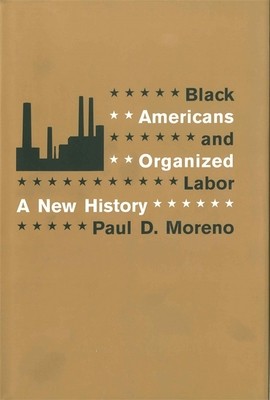
- We will send in 10–14 business days.
- Author: Paul D Moreno
- Publisher: LSU Press
- ISBN-10: 0807133329
- ISBN-13: 9780807133323
- Format: 15.2 x 22.9 x 1.9 cm, softcover
- Language: English
- SAVE -10% with code: EXTRA
Reviews
Description
In Black Americans and Organized Labor, Paul D. Moreno offers a bold reinterpretation of the role of race and racial discrimination in the American labor movement. Moreno applies insights of the law-and-economics movement to formulate a powerfully compelling labor-race theorem of elegant simplicity: White unionists found that race was a convenient basis on which to do what unions do -- control the labor supply. Not racism pure and simple but "the economics of discrimination" explains historic black absence and under-representation in unions.
Moreno's sweeping reexamination stretches from the antebellum period to the present, integrating principal figures such as Frederick Douglass and Samuel Gompers, Isaac Myers and Booker T. Washington, and W. E. B. Du Bois and A. Philip Randolph. He traces changing attitudes and practices during the simultaneous black migration to the North and consolidation of organized labor's power, through the confusing and conflicted post-World War II period, during the course of the civil rights movement, and into the era of affirmative action. Maneuvering across a wide span of time and a broad array of issues, Moreno brings remarkable clarity to the question of the importance of race in unions. He impressively weaves together labor, policy, and African American history into a cogent, persuasive revisionist study that cannot be ignored.
EXTRA 10 % discount with code: EXTRA
The promotion ends in 19d.01:23:57
The discount code is valid when purchasing from 10 €. Discounts do not stack.
- Author: Paul D Moreno
- Publisher: LSU Press
- ISBN-10: 0807133329
- ISBN-13: 9780807133323
- Format: 15.2 x 22.9 x 1.9 cm, softcover
- Language: English English
In Black Americans and Organized Labor, Paul D. Moreno offers a bold reinterpretation of the role of race and racial discrimination in the American labor movement. Moreno applies insights of the law-and-economics movement to formulate a powerfully compelling labor-race theorem of elegant simplicity: White unionists found that race was a convenient basis on which to do what unions do -- control the labor supply. Not racism pure and simple but "the economics of discrimination" explains historic black absence and under-representation in unions.
Moreno's sweeping reexamination stretches from the antebellum period to the present, integrating principal figures such as Frederick Douglass and Samuel Gompers, Isaac Myers and Booker T. Washington, and W. E. B. Du Bois and A. Philip Randolph. He traces changing attitudes and practices during the simultaneous black migration to the North and consolidation of organized labor's power, through the confusing and conflicted post-World War II period, during the course of the civil rights movement, and into the era of affirmative action. Maneuvering across a wide span of time and a broad array of issues, Moreno brings remarkable clarity to the question of the importance of race in unions. He impressively weaves together labor, policy, and African American history into a cogent, persuasive revisionist study that cannot be ignored.


Reviews